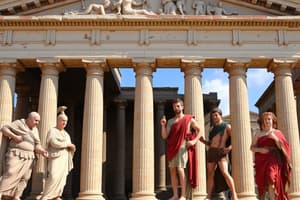Podcast
Questions and Answers
Which civilization is known as the first known civilization that developed writing?
Which civilization is known as the first known civilization that developed writing?
- Indus Valley
- Egypt
- China
- Mesopotamia (correct)
What was a significant cultural achievement of ancient Greece?
What was a significant cultural achievement of ancient Greece?
- First centralized state
- Development of advanced drainage systems
- Birthplace of democracy (correct)
- Invention of the steam engine
What does feudalism primarily represent in the Middle Ages?
What does feudalism primarily represent in the Middle Ages?
- A social hierarchy based on land exchange (correct)
- A movement for human rights
- The rise of industrial economies
- The establishment of global trade routes
Which invention is associated with the Renaissance that greatly impacted communication?
Which invention is associated with the Renaissance that greatly impacted communication?
Which key concept is central to understanding historical events?
Which key concept is central to understanding historical events?
What philosophy is emphasized during the Enlightenment?
What philosophy is emphasized during the Enlightenment?
What was a significant impact of the Industrial Revolution?
What was a significant impact of the Industrial Revolution?
Which movement focuses on racial equality and was prominent in the 20th century?
Which movement focuses on racial equality and was prominent in the 20th century?
Flashcards are hidden until you start studying
Study Notes
Overview of History
- Definition: The study of past events, particularly in human affairs.
- Branches: Political, social, economic, cultural, military history.
Ancient Civilizations
- Mesopotamia: First known civilization; developed writing (cuneiform), agriculture, and urbanization.
- Egypt: Known for pyramids, hieroglyphics, and a centralized state under pharaohs.
- Indus Valley: Advanced urban planning, drainage systems, and trade networks.
- China: Early dynasties like Xia, Shang, and Zhou; contributions include writing and philosophy (Confucianism, Taoism).
Classical Antiquity
- Greece: Birthplace of democracy, philosophy (Socrates, Plato, Aristotle), and the Olympic Games; major wars (Peloponnesian War).
- Rome: Republic to Empire; known for law, engineering (aqueducts, roads), and cultural assimilation (Hellenistic influence).
Middle Ages
- Feudalism: Social hierarchy; land exchanged for service; notable figures (Charlemagne).
- The Church: Powerful institution influencing politics, culture, and education.
- Crusades: Religious wars aimed at reclaiming the Holy Land; impact on trade and cultural exchange.
Renaissance
- Rebirth of classical learning; emphasis on humanism, art, and science.
- Key figures: Leonardo da Vinci, Michelangelo, Galileo.
- Innovations: Printing press, exploration (Columbus, Magellan).
Enlightenment
- Intellectual movement emphasizing reason, individualism, and skepticism of authority.
- Key thinkers: John Locke, Voltaire, Rousseau.
- Influences: American Revolution, French Revolution.
19th Century
- Industrial Revolution: Shift from agrarian economies to industrial; urbanization, technological advancements (steam engine, textiles).
- Imperialism: European powers expanded territories in Africa and Asia.
- Social movements: Labor rights, women's suffrage, and abolition of slavery.
20th Century
- World Wars: WWI (1914-1918) and WWII (1939-1945); causes, major battles, consequences.
- Cold War: Tensions between the U.S. and Soviet Union; arms race, space race, proxy wars.
- Civil Rights: Movements for racial equality, gender equality, and decolonization.
Contemporary History
- Globalization: Increased interconnectedness in economy, culture, and politics.
- Digital Revolution: Impact of the internet and technology on society and communication.
- Current Issues: Climate change, geopolitical tensions, social inequality.
Key Concepts
- Historical Context: Importance of understanding events within their time.
- Cause and Effect: Analyzing how events influence one another.
- Primary vs. Secondary Sources: Distinguishing between original documents and interpretations.
Overview of History
- History examines past human events and their implications.
- Key branches include:
- Political history: governance and power dynamics.
- Social history: societal structures and relationships.
- Economic history: trade, production, and consumption patterns.
- Cultural history: art, religion, and intellectual movements.
- Military history: conflicts, strategies, and their impacts.
Ancient Civilizations
- Mesopotamia: Recognized as the first civilization; origins of cuneiform writing, agriculture, and urban societies.
- Egypt: Notable for monumental architecture (pyramids), hieroglyphics, and centralized governance under pharaohs.
- Indus Valley: Advanced urban infrastructure with sewage systems and extensive trade routes.
- China: Early dynastic systems (Xia, Shang, Zhou) contributed to writing development and philosophical thought (Confucianism, Taoism).
Classical Antiquity
- Greece: Introduced democracy, influential philosophers (Socrates, Plato, Aristotle), and the tradition of the Olympic Games; significant conflicts such as the Peloponnesian War.
- Rome: Transitioned from Republic to Empire; renowned for legal frameworks, engineering feats (aqueducts, road systems), and the integration of diverse cultures (Hellenistic influences).
Middle Ages
- Feudalism: Defined by a structured social hierarchy; land ownership linked to obligations of service, illustrated by figures like Charlemagne.
- The Church: Became a dominant force in Europe, shaping politics, culture, and education.
- Crusades: A series of religious military campaigns for the Holy Land, leading to increased trade and cultural exchanges across regions.
Renaissance
- Marked a revival of classical knowledge and learning; focus on humanism, arts, and scientific inquiry.
- Prominent figures include Leonardo da Vinci (art and innovation), Michelangelo (sculpting and painting), and Galileo (astronomy advancements).
- Innovations such as the printing press revolutionized communication; exploration efforts led by figures like Columbus and Magellan expanded global awareness.
Enlightenment
- An intellectual movement that prioritized reason, individual rights, and skepticism towards established authority.
- Influential thinkers include John Locke (social contract theory), Voltaire (critical of religious dogma), and Rousseau (concept of general will).
- Fueled revolutionary sentiments in the American Revolution and the French Revolution.
19th Century
- Industrial Revolution: Significant transition from agricultural to industrial economies; urban growth and technological innovations (steam engine, textile manufacturing).
- Imperialism: European nations expanded their empires into Africa and Asia, seeking resources and strategic advantages.
- Social movements gained momentum, advocating for labor rights, women's suffrage, and the abolition of slavery.
20th Century
- World Wars: Major conflicts with global implications; WWI resulted in vast geopolitical changes, while WWII highlighted human rights violations and shaped the modern world order.
- Cold War: Characterized by ideological rivalry between the U.S. and Soviet Union; included an arms race, space race, and numerous indirect conflicts (proxy wars).
- Civil Rights: Key movements sought equality across racial, gender, and post-colonial lines, striving for social justice and reform.
Contemporary History
- Globalization: Leads to an increased interdependence among nations in economic, cultural, and political spheres.
- Digital Revolution: Transformation in communication and information sharing driven by the internet and technological advances.
- Current issues confronting society include climate change, geopolitical conflicts, and social inequality, demanding global attention.
Key Concepts
- Historical Context: Understanding events within their temporal and cultural backgrounds is crucial for analysis.
- Cause and Effect: Investigating how past occurrences trigger subsequent events enhances comprehension of history.
- Primary vs. Secondary Sources: Differentiating between firsthand accounts (primary) and interpretations (secondary) is essential for accurate historical research.
Studying That Suits You
Use AI to generate personalized quizzes and flashcards to suit your learning preferences.





